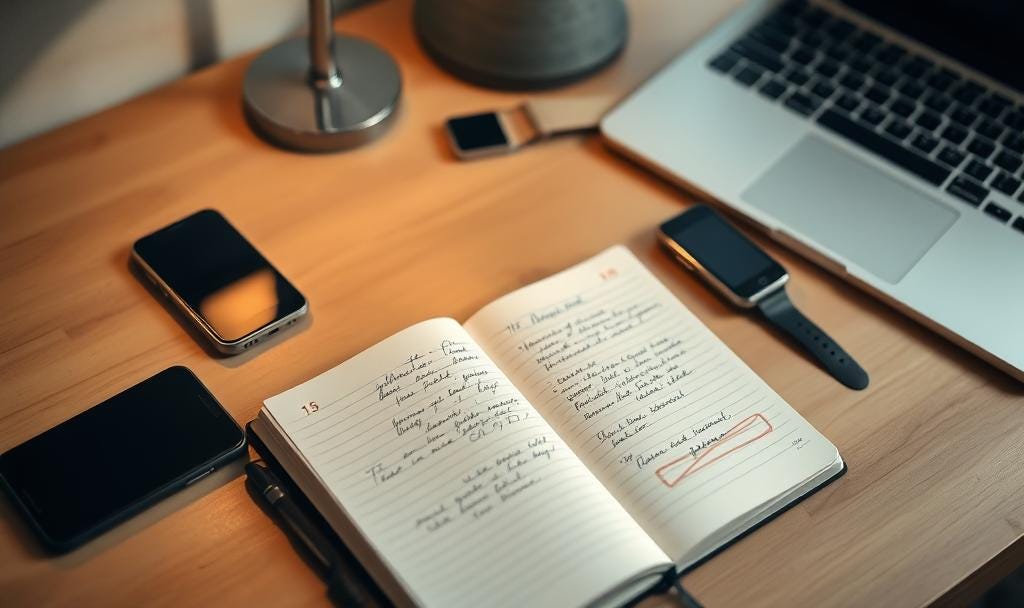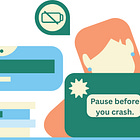Self-Care or Surveillance? When Journaling Turns on You
When the tools for self-awareness start to feel like self-control.
Hey, checking in, because the quiet stuff matters too. Today’s reflection: What happens when your self-care ritual starts giving performance review energy?
Once upon a time, journaling felt like an exhale. A place to brain-dump, to feel things without needing to explain them, to write things like “I’m mad and I don’t know why” without feeling like you had to attach a mood graph and three supporting footnotes.
But somewhere along the way, something shifted.
Now your journal is looking at you sideways like, “Still stuck on that? Weren’t we here last week?” And suddenly, what used to feel like your softest space is now silently taking notes like an underpaid intern in your brain’s HR department.
When reflection becomes a lifestyle brand
We are, after all, in a golden era of self-reflection. Journaling has joined the ranks of lemon water, apple cider vinegar, tongue scraping, and oat milk lattes as a key pillar in the morning routine lineup (I’m an unsweetened almond milk latte person, though), a familiar pattern for anyone who’s ever felt like self-care starts to feel like work. The algorithm has spoken: journaling will clear your mind, align your chakras, balance your nervous system, and maybe solve generational trauma if you write long enough.
And hey, journaling is great. There’s solid science behind it. It can ease anxiety (I would know), organize your thoughts, help you process emotion. It’s cheaper than therapy, and you don’t have to find parking.
But the culture around journaling? That’s where things get interesting.
When self-reflection becomes part of your brand, the stakes shift.
You start worrying about whether your entries are insightful enough. Whether you're “doing it right.” Whether your inner monologue needs editing for tone. And just like that, you’re not journaling. You’re now performing emotional labor for a very judgmental audience: Future You.
The journal as a quiet micro-Manager
Here’s where things go sideways: the very tools meant to support you can start making you feel like you’re under surveillance.
You skip a day? You notice.
You write the same thing three days in a row? You cringe.
You say something petty, dramatic, or not emotionally evolved? You censor.
Suddenly your journal becomes less of a trusted confidant and more like the manager from your last job, asking if you’ve “circled back” on your inner child’s unresolved abandonment wound. (Wait, what?) What started as a safe place to scribble your mess turns into a spreadsheet with feelings.
We don’t talk enough about this: how quickly self-tracking can become self-policing. You’re not just documenting your life; you’re grading it. Charting your moods. Flagging your bad habits. Comparing Tuesday You to Thursday You, like you’re running an internal KPI dashboard.
And listen, if this all sounds dramatic, maybe it is. But if you’ve ever felt guilt over a blank page or shame for not having “grown” fast enough, you know exactly what I mean.

The pressure to be insightful
Modern journaling advice often comes with prompts. Structure. Reflection goals. Some are helpful. Some are... a little much.
Example:
“What limiting beliefs am I releasing today?”
What if today I’m not releasing anything? What if today I’m just tired and mildly annoyed that I have to answer to a prompt that assumes I’m in the middle of a breakthrough?
There’s a fine line between self-reflection and self-interrogation.
You start to ask not just “How do I feel?” but “Why am I still feeling this?”
Not just “What’s showing up for me?” but “How do I optimize this emotional arc?” It’s a shift that starts to happen when growth starts to feel like performance.
You go from asking questions to answering for yourself, missing the subtler emotional cues that often show up before the emotional cliff.
Spoiler: That’s not care. That’s a performance review in lowercase cursive.
When the digital journal becomes a spreadsheet
Then there’s the rise of journaling apps. Mood-tracking. Color-coded entries. Graphs of your happiness score. A sweet little AI-generated reflection that says: “You seem a little off today, have you tried hydration and grace?”
And look, digital tools can be helpful. But they also turn your emotional life into a dashboard.
Your sadness? A bar chart.
Your joy? A 12-day streak.
Your existential dread? Currently trending at 3 out of 5 stars.
It's like turning your heart into a Fitbit.
At some point, the quiet intention of “let me see myself more clearly” turns into “let me manage myself more efficiently.”
Same tools. Very different vibe.
How to journal without feeling monitored
Journaling doesn’t have to be productive. Or wise. Or daily. Or legible. Or aligned with your inner goddess. You’re allowed to journal badly. You’re allowed to write “ugh” and nothing else. You’re allowed to write “I’m sad” 47 times in a row. You’re allowed to write something that sounds emotionally regressed because it’s true in the moment. That’s not failing at healing. That’s feeling your healing.
Here are a few ways to reclaim journaling as a space of actual care:
1. Journal like no one’s watching (because they’re not)
If you find yourself performing for your future self, remind yourself:
you are not submitting this for peer review. You are not writing the next bestselling memoir.
No one will ever see this. Not even you, if you don’t want to. Write it, close the book, and go eat a snack.
2. Don’t overthink the blank page
You’re not writing the Magna Carta. You’re venting.
Try this starter:
“Here’s what’s true right now, even if I don’t have a clever takeaway.”
Boom. You’re journaling. The end.
3. Skip the prompts. Or write your own.
Prompts can be helpful, but also kind of bossy.
If “What am I releasing?” feels too intense, try gentler ones:
What do I wish I could say out loud today?
What’s annoying me and why is it probably not that deep?
What would I write if I knew no one would ever read it? (Because they won’t. And if they do, they deserve to be confused.)
4. Embrace low-effort emotional logging
Not every day is a monologue. Some days are just bullet points.
Example:
Tired
Want coffee
Low-key spiral about nothing
Might delete later
That counts. That absolutely counts.
5. Let it be messy
You are not a brand. You are a whole, chaotic human. Your journal can (and should) reflect that. If your entries sound like you’re trying to win the “Most Emotionally Self-Aware” award, take a break. Go write something stupid. Scribble. Vent. Use all caps. Be petty. Be honest.
You can be insightful later. Or never.
The journal isn’t the point. You are.
At the end of the day, journaling is just a tool. It’s not the growth. It’s not the healing. It’s just a flashlight. And if that flashlight starts to feel like a security camera, it’s okay to put it down.
You don’t need to be watched to be worthy. You don’t need to document your feelings for them to matter. You don’t need to make emotional progress on a timeline that fits inside a notebook.
Some days, reflection is powerful. Other days, it’s just nice to write “I don’t know what I’m doing” and close the book.
And… also because emotional healing isn’t always grand gestures, here’s a little honest check-in from me this week:

One thing that grounded me: A spontaneous walk to get a Starbucks latte, even in 100° heat. No phone, no agenda. Just me and the bad decision.
One thing that ungrounded me: Getting sucked into comment sections on someone else’s emotional breakdown.
Your turn. What’s one small thing that grounded or ungrounded you this week?
If this resonated, here are a few companion reads:
If you’re new here, here’s your soft landing




